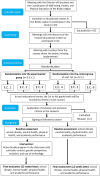Effects of video-guided active breaks with curricular content on mental health and classroom climate in chilean schoolchildren aged 6 to 10: study protocol for a multicentre randomized controlled trial
- PMID: 39328832
- PMCID: PMC11424538
- DOI: 10.3389/fphys.2024.1438555
Effects of video-guided active breaks with curricular content on mental health and classroom climate in chilean schoolchildren aged 6 to 10: study protocol for a multicentre randomized controlled trial
Abstract
Background: The incidence of mental health issues in children is increasing worldwide. In Chile, a recent surge in reports of deteriorating mental health among school populations and an increase in complaints related to poor school climate have been observed. Physical activity, specifically active breaks in the classroom, has shown positive effects on children's health. However, evidence regarding its impact on mental health and school climate in children is limited.
Objective: This work outlines the design, measurements, intervention program, and potential efficacy of the "Active Classes + School Climate and Mental Health" project. This project will assess a 12-week program of active breaks through guided videos with curricular content in the school classroom, and its effects on mental health and school climate as its primary indicators. Additionally, it will measure physical activity, physical fitness, motor competence, and academic performance in students aged 6-10 years in the Biobío province, Chile, as secondary indicators. Methodology: A multicenter randomized controlled trial involving 823 students from 1st to 4th grade (6-10 years old), six schools (three intervention and three control) will be conducted in the Biobío region, Chile. Participants belonging to the intervention group will implement video-guided active breaks through the "Active Classes" web platform, featuring curricular content, lasting 5-10 min and of moderate to vigorous intensity physical activity, twice a day, Monday to Friday, over a span of 12 weeks. Expected Results/Discussion: To our knowledge, this will be the first study in Chile to evaluate the effects of incorporating video-guided active breaks with curricular content on mental health variables and school climate in schoolchildren. Thus, this study contributes to the scarce evidence on the effects of video-guided active breaks on mental health variables and school climate in schoolchildren worldwide. Additionally, it will provide crucial information about active teaching methodologies that have the potential to positively contribute to the wellbeing of students, thus addressing the problems of mental health and climate in Chilean schools. ClinicalTrials.gov ID NCT06423404.
Keywords: RCT; physical exercise; physical fitness; primary school; school climate children; school-based intervention.
Copyright © 2024 Zapata-Lamana, Robles-Campos, Reyes-Molina, Rojas-Bravo, Salcedo Lagos, Chávez-Castillo, Gajardo-Aguayo, Villalobos, Arias, Sanhueza-Campos, Ibarra Mora, Reyes-Amigo, Cristi-Montero, Sánchez-Oliva, Ruiz-Hermosa, Sánchez-López, Poblete-Valderrama, Celis-Morales, Martorell, Carrasco-Marín, Albornoz-Guerrero, Parra-Rizo and Cigarroa.
Conflict of interest statement
The authors declare that the research was conducted in the absence of any commercial or financial relationships that could be construed as a potential conflict of interest.
Figures
References
-
- Agencia Nacional de Educación (2022). Diagnóstico Integral de Aprendizajes. Available at: https://diagnosticointegral.agenciaeducacion.cl/.
-
- Aron A. M., Milicic N., Armijo I. (2012). Clima Social Escolar: Una escala de evaluación –Escala de Clima Social Escolar, ECLIS–. Univ. Psychol. 11 (3), 814. Article 3. 10.11144/Javeriana.upsy11-3.csee - DOI
-
- Bacher-Hicks A., Goodman J., Green J. G., Holt M. K. (2022). The COVID-19 pandemic disrupted both school bullying and cyberbullying. Am. Econ. Rev. Insights 4 (3), 353–370. 10.1257/aeri.20210456 - DOI
Associated data
LinkOut - more resources
Full Text Sources
Medical



